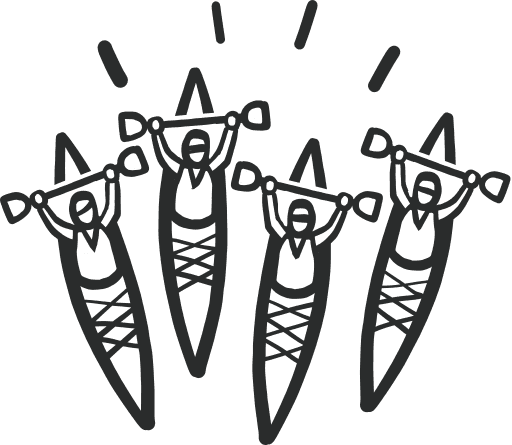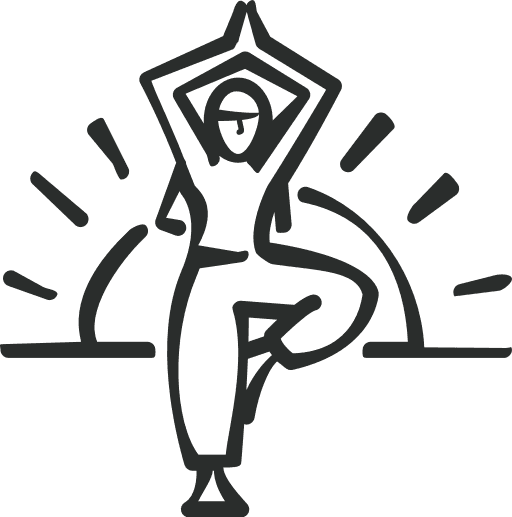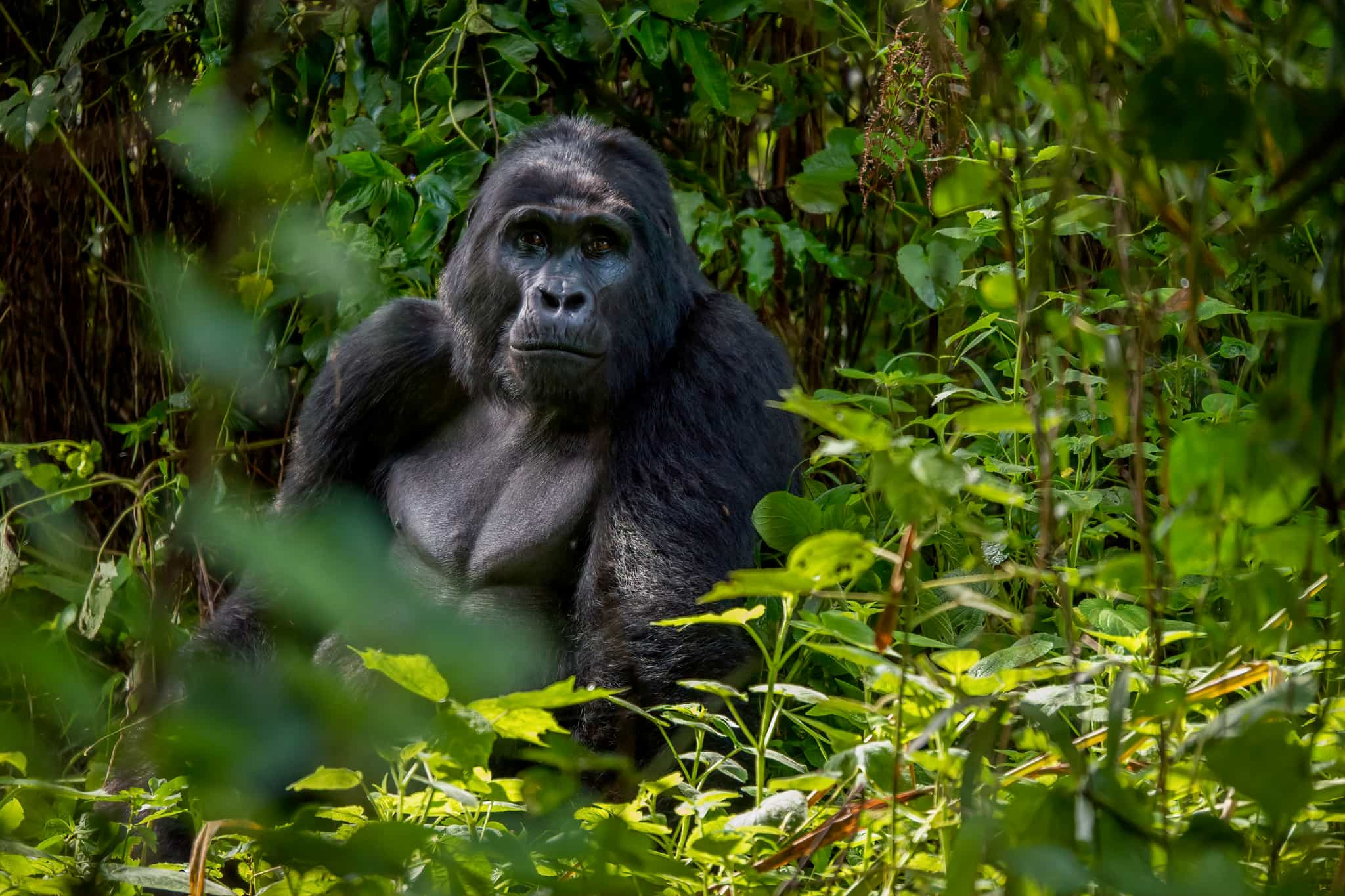
Mountain Trekking and Gorilla Safari in Uganda
Traverse the 'Mountains of the Moon' to reach Africa’s third highest peak and see the mountain gorillas of Bwindi
What's Included?
Small Like-minded Groups
Solo-friendly by design, join our small n’ sociable groups of up to 14 like-minded, active and outdoorsy people…
…
What's it like?

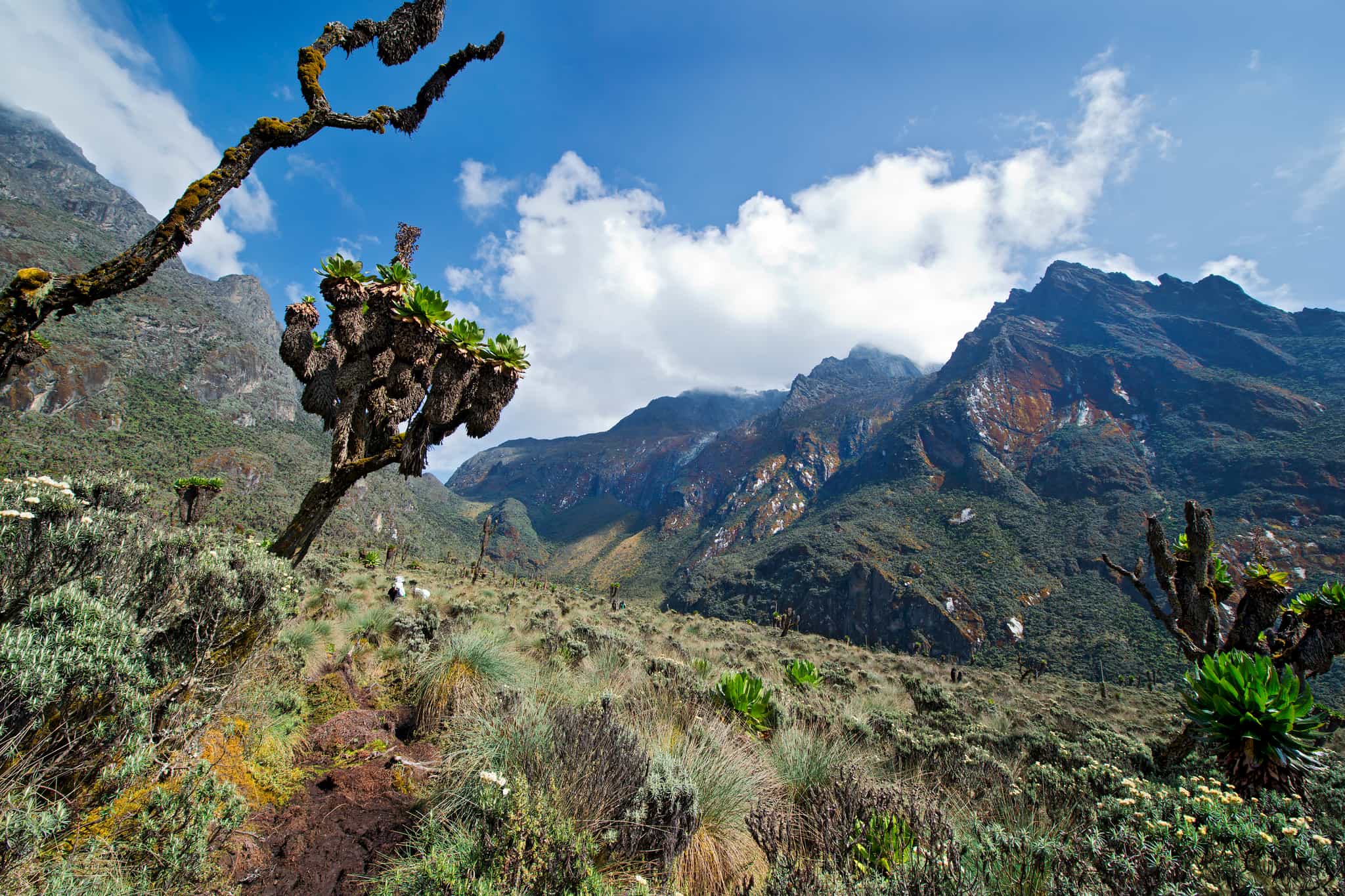
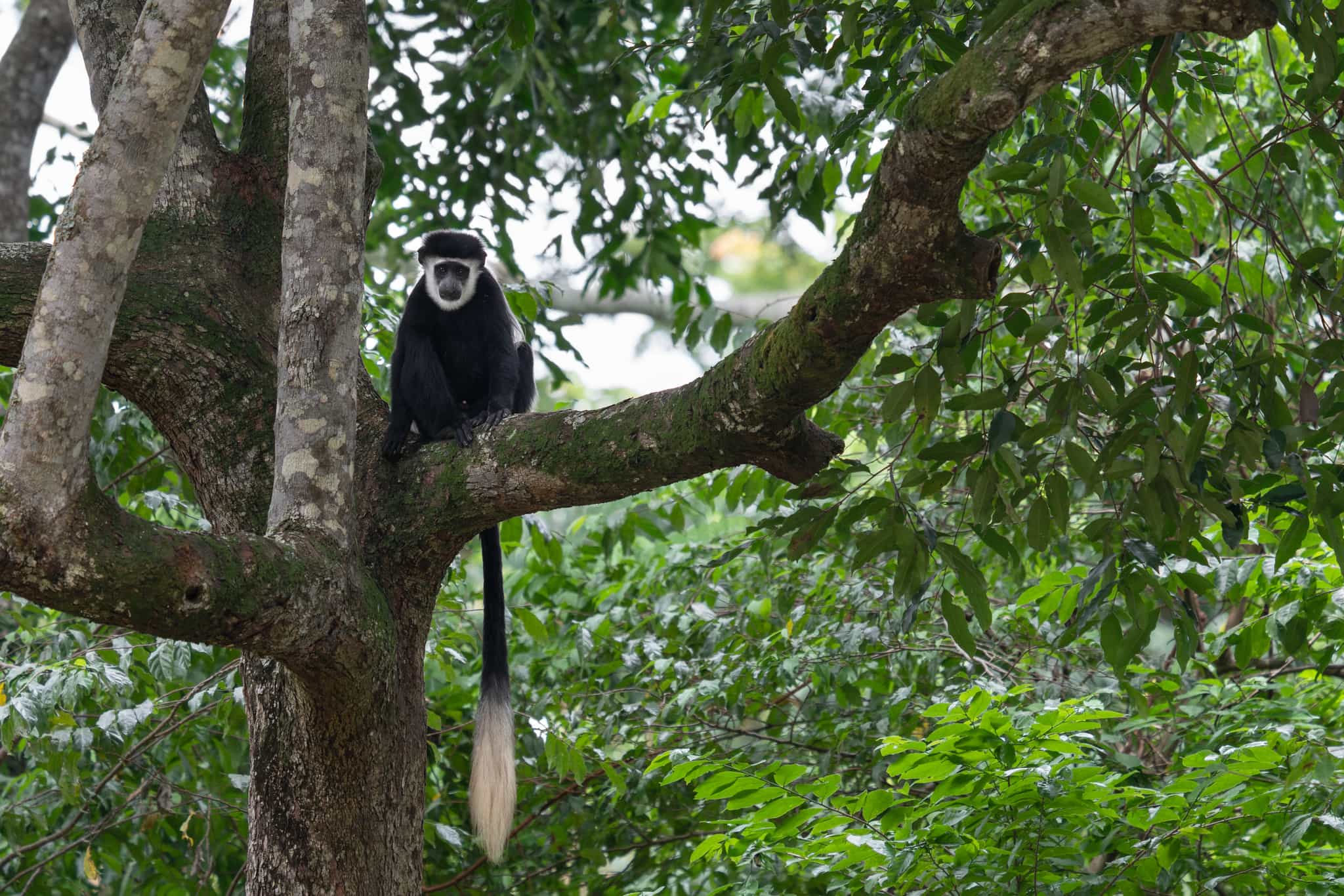
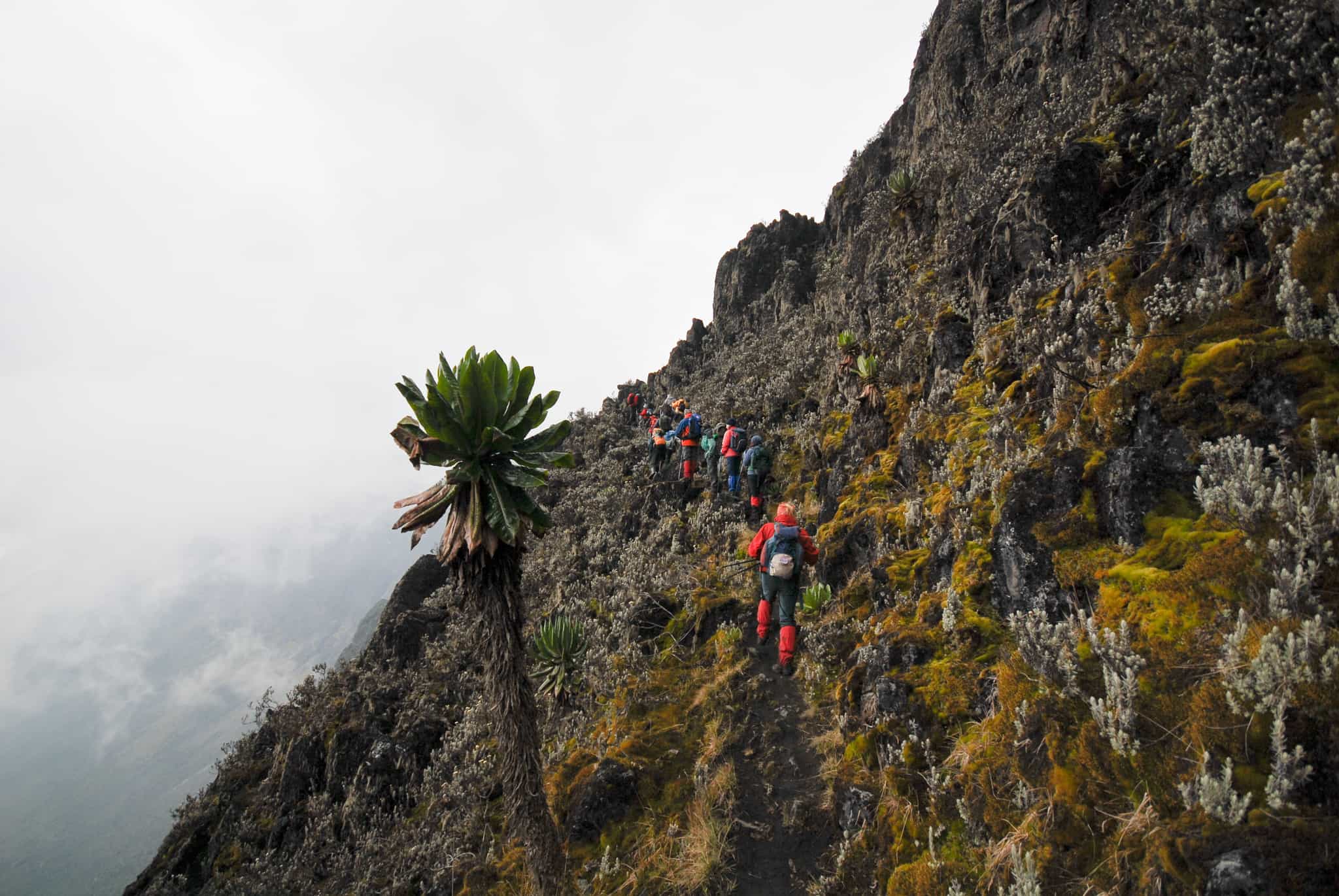


Tackle a hut-to-hut circuit on a trek like no other in the Rwenzori Mountains – Africa's best-kept secret
Don your crampons and summit Mount Stanley's Margherita Peak (5109m): the highest point in Uganda and Congo
Trek through the Bwindi Impenetrable Forest to see Uganda’s enigmatic mountain gorillas – the ultimate wildlife bucket list moment
Head out on a game drive in Queen Elizabeth National Park, eyes open for elephants, lions, giraffes, antelopes and more
Key Information
Day 1
Welcome to Uganda!
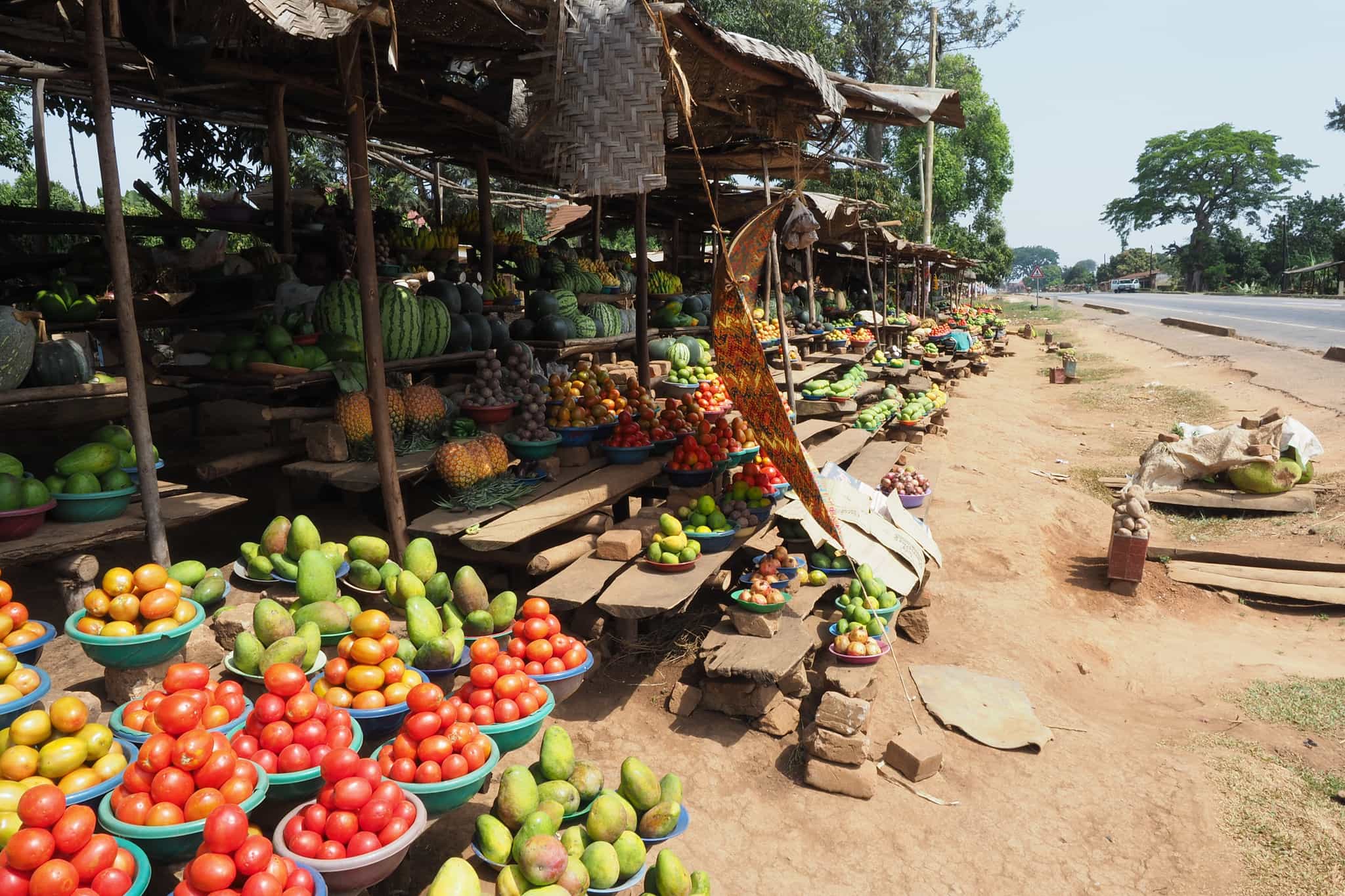
Upon arrival, you'll be met at Entebbe Airport and transferred to a hotel on the edge of the city. Meet up with your fellow adventurers and your guide, relax into the local vibe over dinner with a chat through the adventure ahead.
Day 2
Road trip to the Rwenzoris
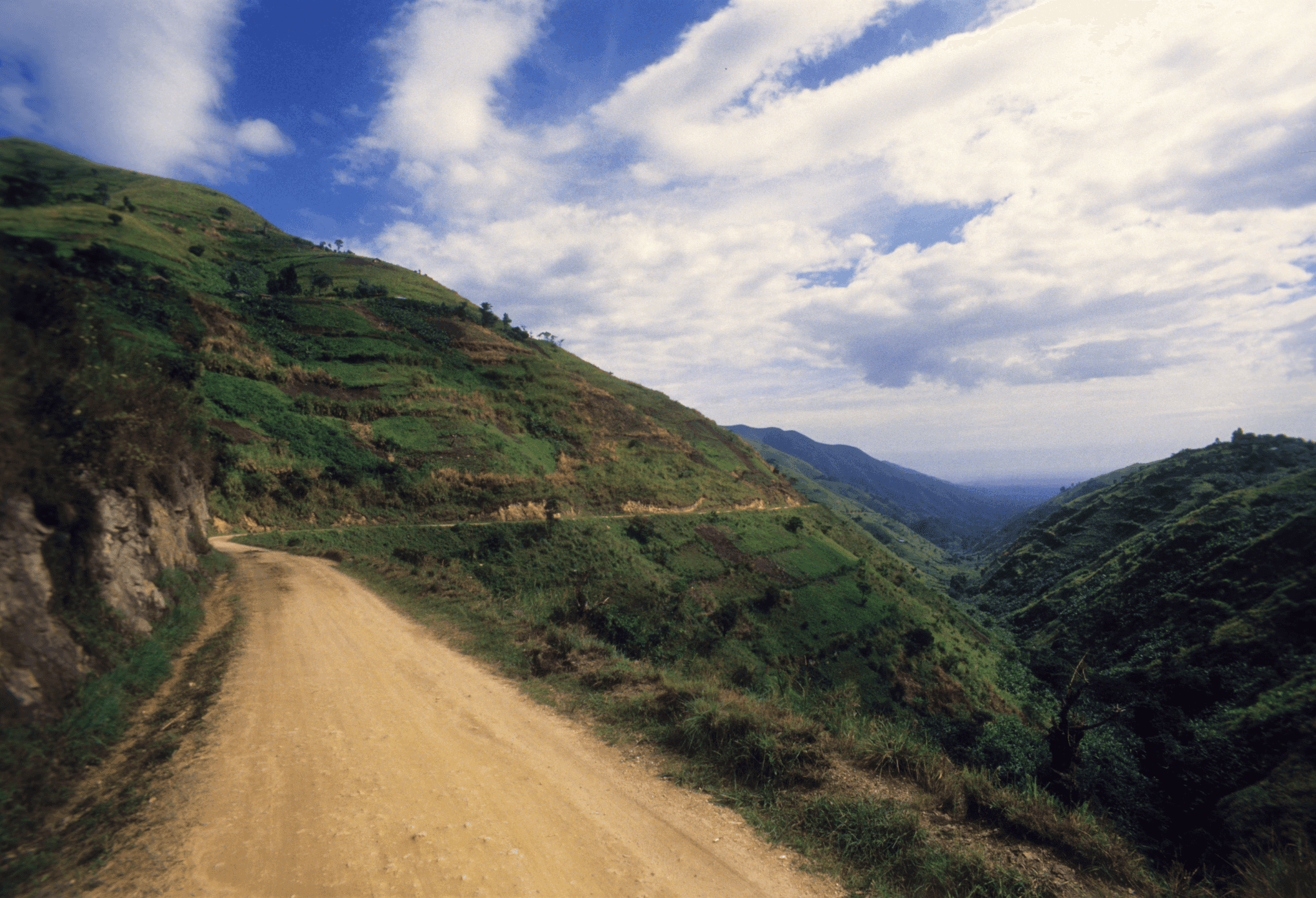
Driving
In the morning you’ll hop in the van, heading westwards towards the Rwenzori Mountains, aka 'the Mountains of the Moon'. Watch Uganda unfold out of the window as you road trip through farms, tea estates, thick green forests and rolling hills. Stop for lunch on the way, and stretch your legs on the edge of Kibale National Park. Later on, you'll reach Ruboni Community Camp in the Rwenzori foothills, where you can settle into the lodge for dinner ready for the true adventure kicking off tomorrow.
Day 3
The trek begins
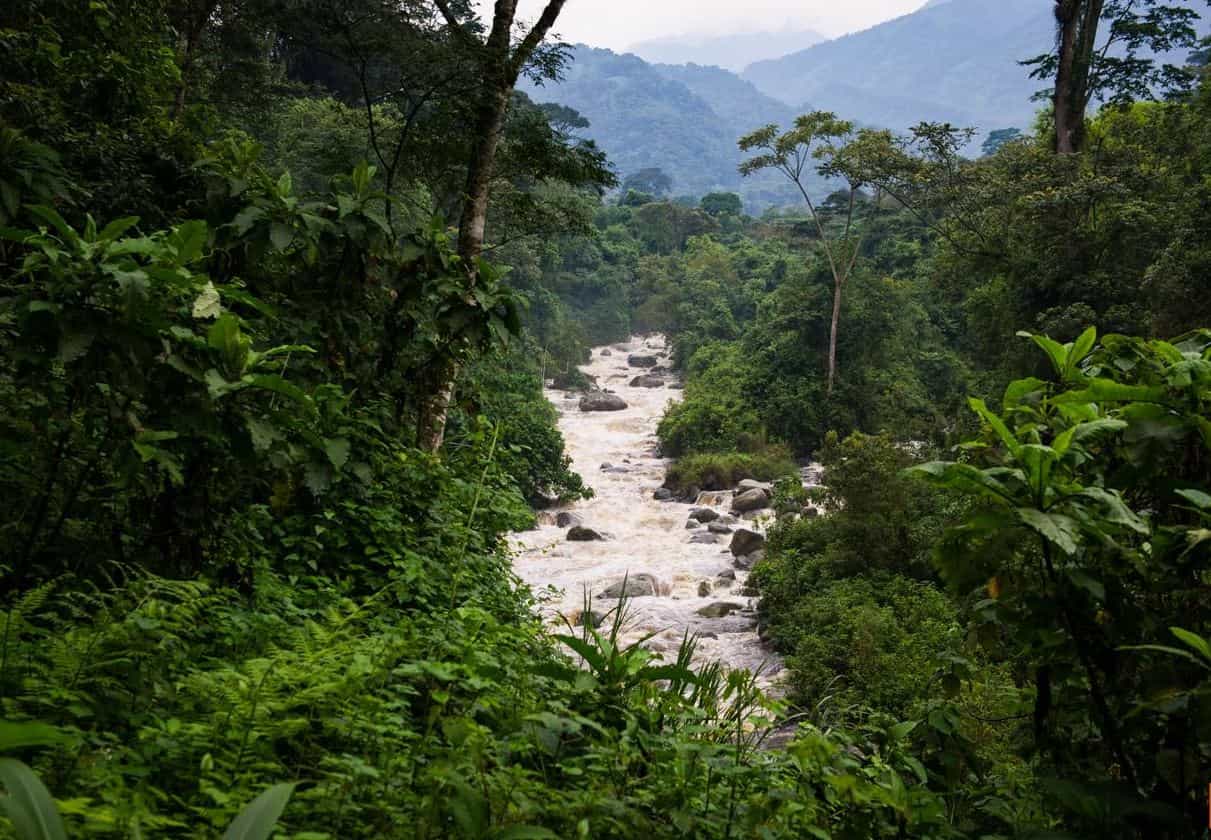
Hiking
Drive to Nyakalengija at 1615m above sea level, where the trek begins. Say hello to your expedition team of guides, porters and cooks and run through a final equipment check before hitting the trail. Meander through farmlands and a thick forest along the Mubuku River, crossing the Mahoma River tributary before starting the long, steep ascent up onto a massive ridge to reach Nyabitaba Hut at 2651m. During this part of the trek you are likely to hear chimpanzees and see black and white colobus monkeys, blue monkeys and the dazzlingly coloured Rwenzori turaco.
Day 4
Nyabitaba to John Matte Hut (3505m)
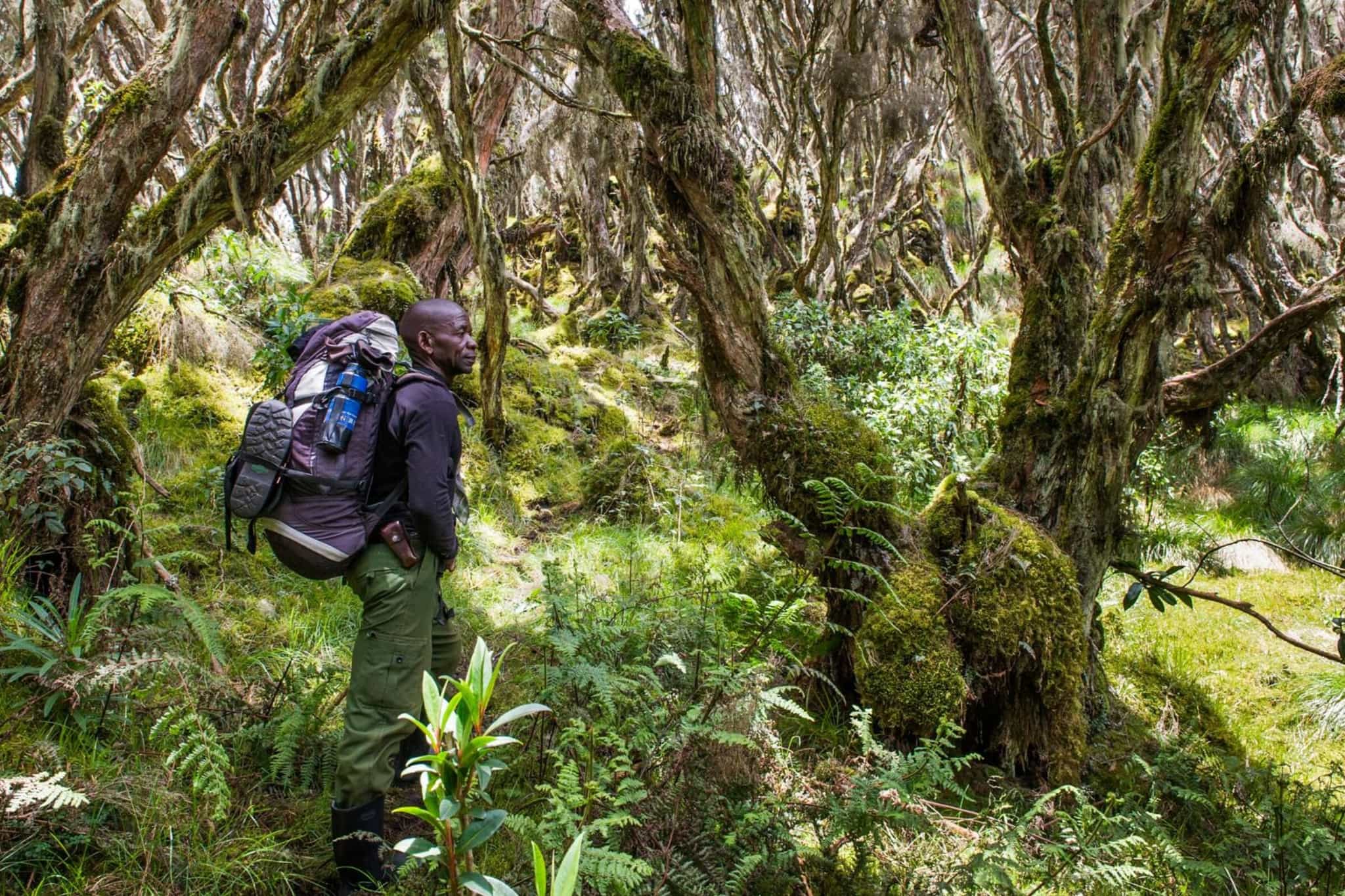
Trekking
Wake up early and hit the trail that drops down through a forest to the Kurt Shafer Bridge, just below the convergence of the Mubuku and Bujuku rivers. Passing through bamboo forest, traverse through a long and tough-going stretch of slippery, moss-covered rocks. From the Nyamuleju rock shelter, Mount Stanley and Mount Speke can be seen before a transitory zone of the giant heather, lobelia and groundsel. Finally, you'll reach John Matte Hut where you'll have dinner and sleep for the night.
Day 5
Bujuku Hut (3962m)
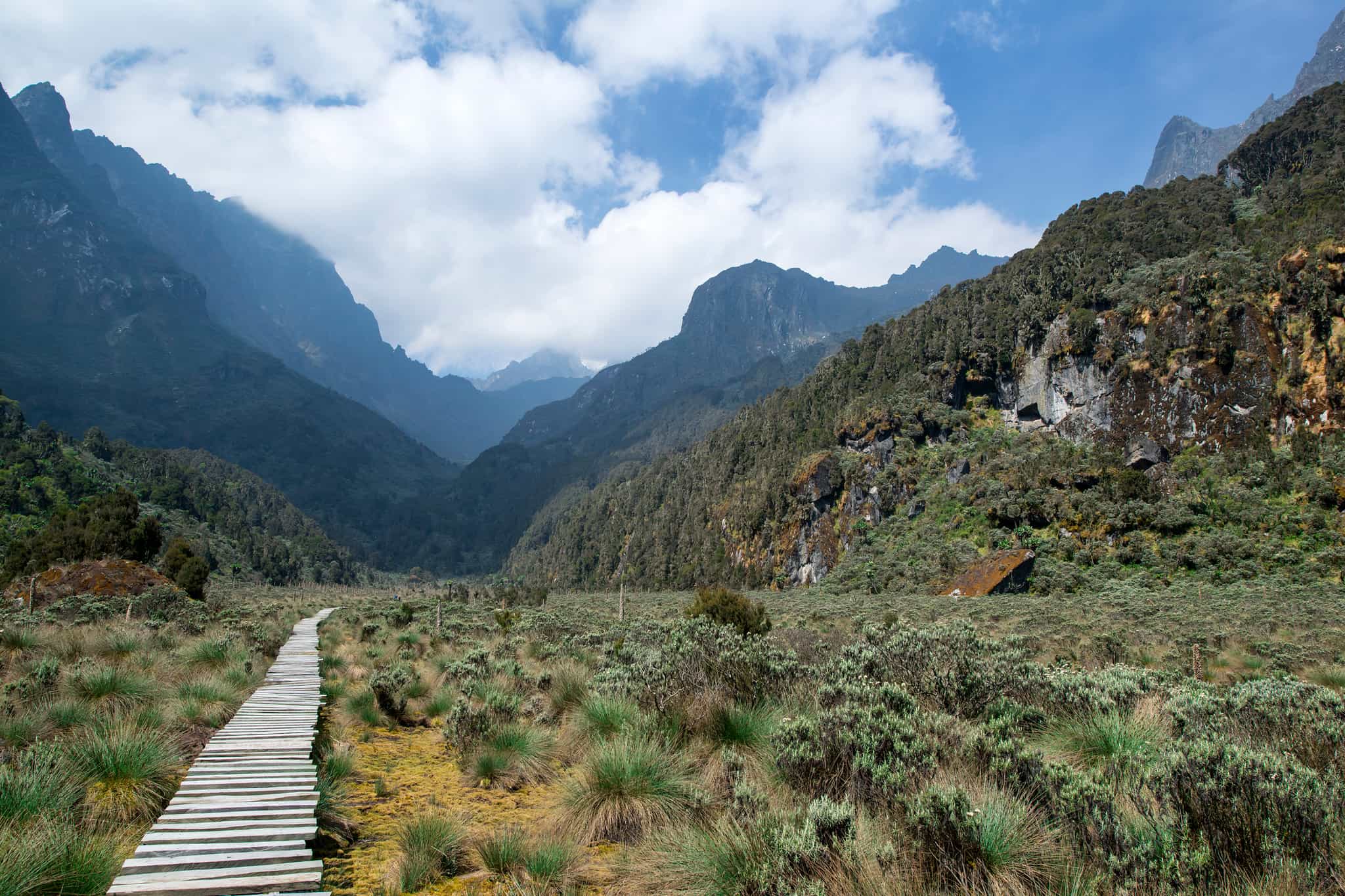
Trekking
From John Matte Hut the trail drops down to cross the Bujuku River and over a long boardwalk across Lower Bigo Bog, with some jumping from tussock to tussock required at certain points. The Upper Bigo Bog gives way to Bujuku Lake, with views of the famous Mount Baker and Mount Stanley. Bujuku Hut is located in the shadow of Mount Baker and Mount Speke, set in a narrow valley below Stuhlmann Pass. Settle in for dinner beneath these giant peaks.
Day 6
Climb to Elena Hut (4541m)
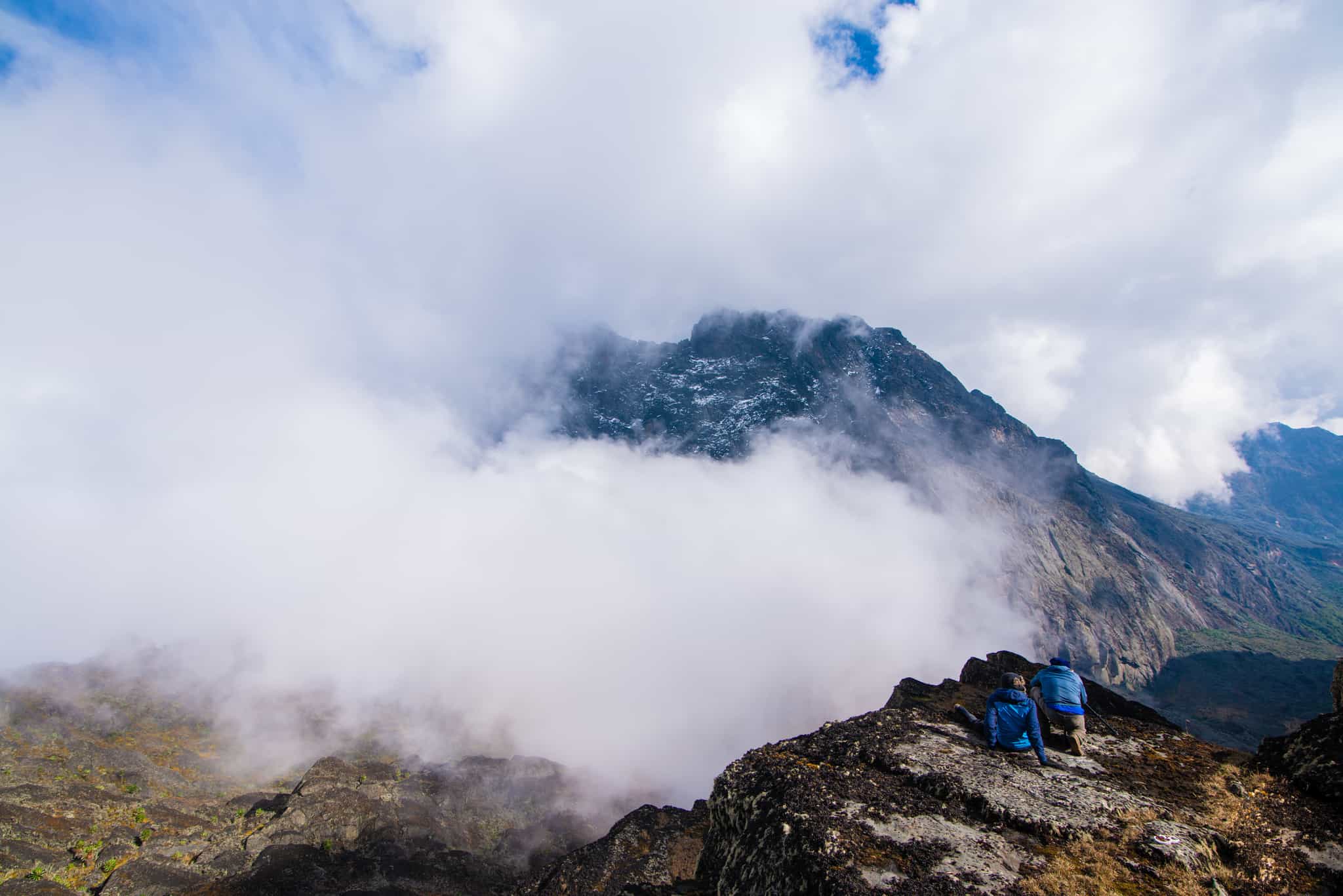
Trekking
The terrain changes as you get clamber above 4000m today, with the forest giving way to more stark landscapes on the climb up to Elena Hut on Mount Stanley. You'll navigate a steep, narrow trail over large boulders in this mid-section, sandwiched between the verdant green below and the snowcapped peaks above. Reach your next mountain hut at 4541m, where your guides will run over the plan for tomorrow's summit day, including a safety run-through and some instruction on using crampons, ice axes and the group being roped together at points.
Day 7
Summit Mount Stanley's Margherita Peak (5109m)
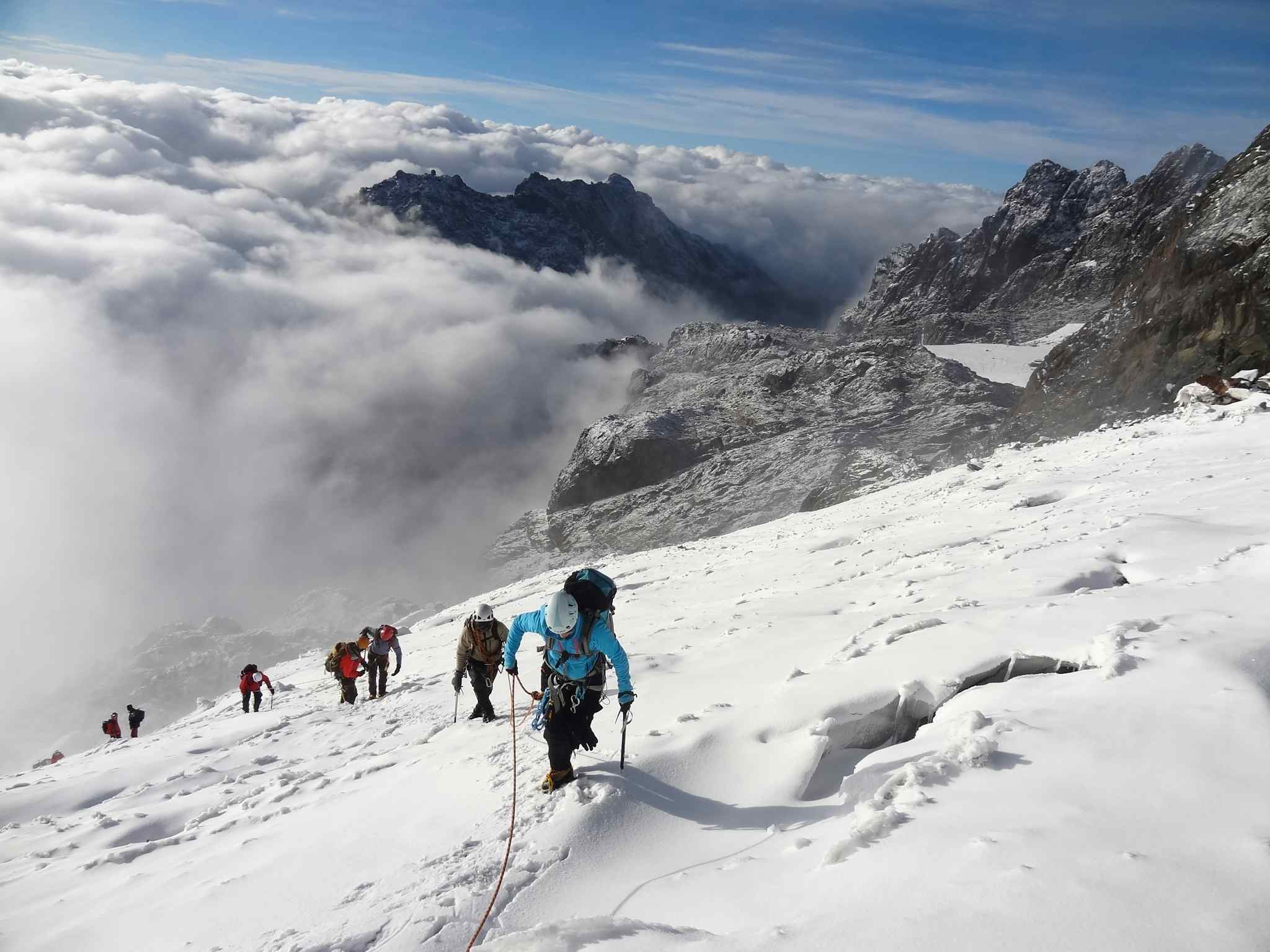
Trekking
The big one. Rise early and gear up for the push to the snowcapped Margherita Peak of Mount Stanley. This is the third highest point in Africa, after Kilimanjaro and Mount Kenya. With crampons on, you'll traverse glaciers across the Stanley Plateau as you proceed to the ascent. The climb is gradual to help with the altitude, resulting in one final scramble to the summit overlooking the Rwenzori range. Descend back to Elena Hut and fuel up with a post-summit lunch, before hiking down further to the Scott-Elliot pass and by the Kitandara Lakes to reach the Kitandara huts for dinner and a well-earned night's sleep.
Day 8
Kitandara to Guy Yeoman Hut
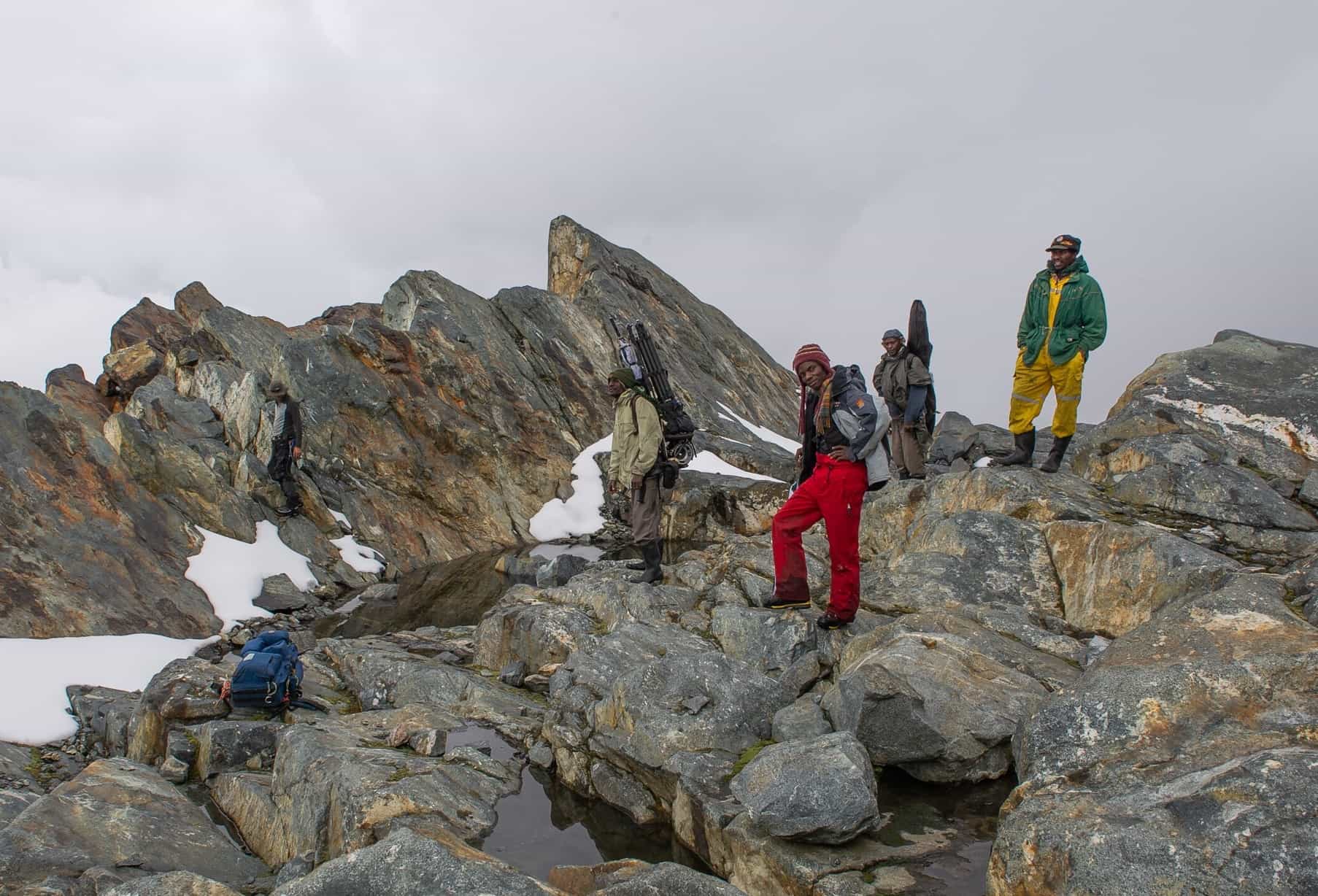
Trekking
Ascend a steep headwall at the bottom of Mount Baker and continue along the south side of the mountain to Fresh Field Pass (4282m). At this point, you can view the Democratic Republic of Congo to the west and Mount Stanley to the north. From the pass, take on the long, steady descent through steep rocky trails and the rock shelter at Bujongolo. This was the base camp for the historic expedition by the Duke of Abruzzi in 1906 – the first recorded summit of Mount Stanley, which gave Margherita Peak its name (after Queen Margherita of Italy). Arrive at Guy Yeoman Hut for dinner before bedding down for the night.
Day 9
The final descent
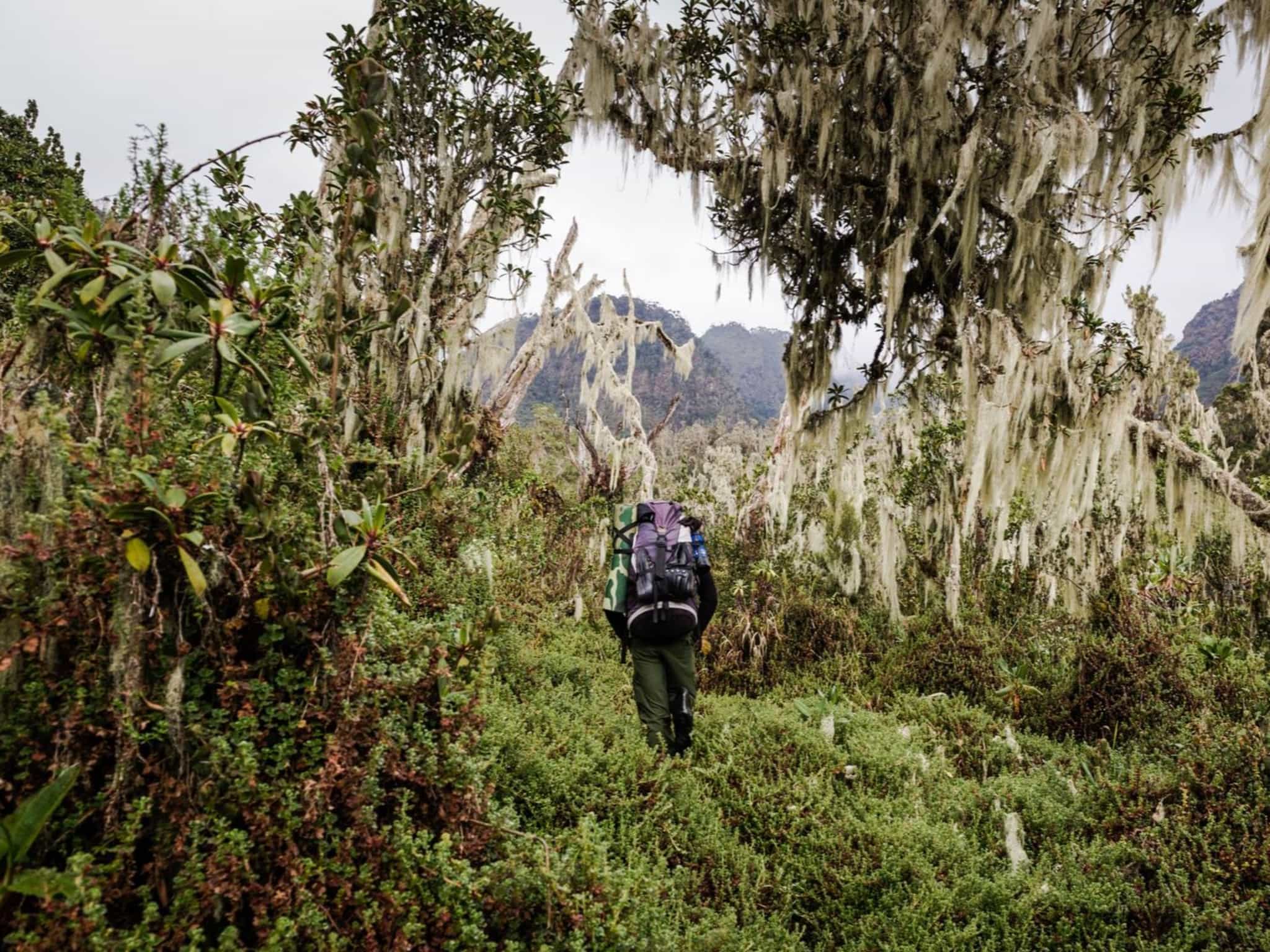
Trekking
It's all downhill from here on the final day of your Rwenzori trekking expedition. The route descends Kichuchu cliff and on a muddy path through the Mubuku River and a bamboo forest, before climbing downwards to Nyabitaba to complete the Margherita Peak circuit. Continue descending to Nyabitaba Hut and finish your trek by the evening at the Nyakalengija base camp.
Day 10
Safari in Queen Elizabeth National Park
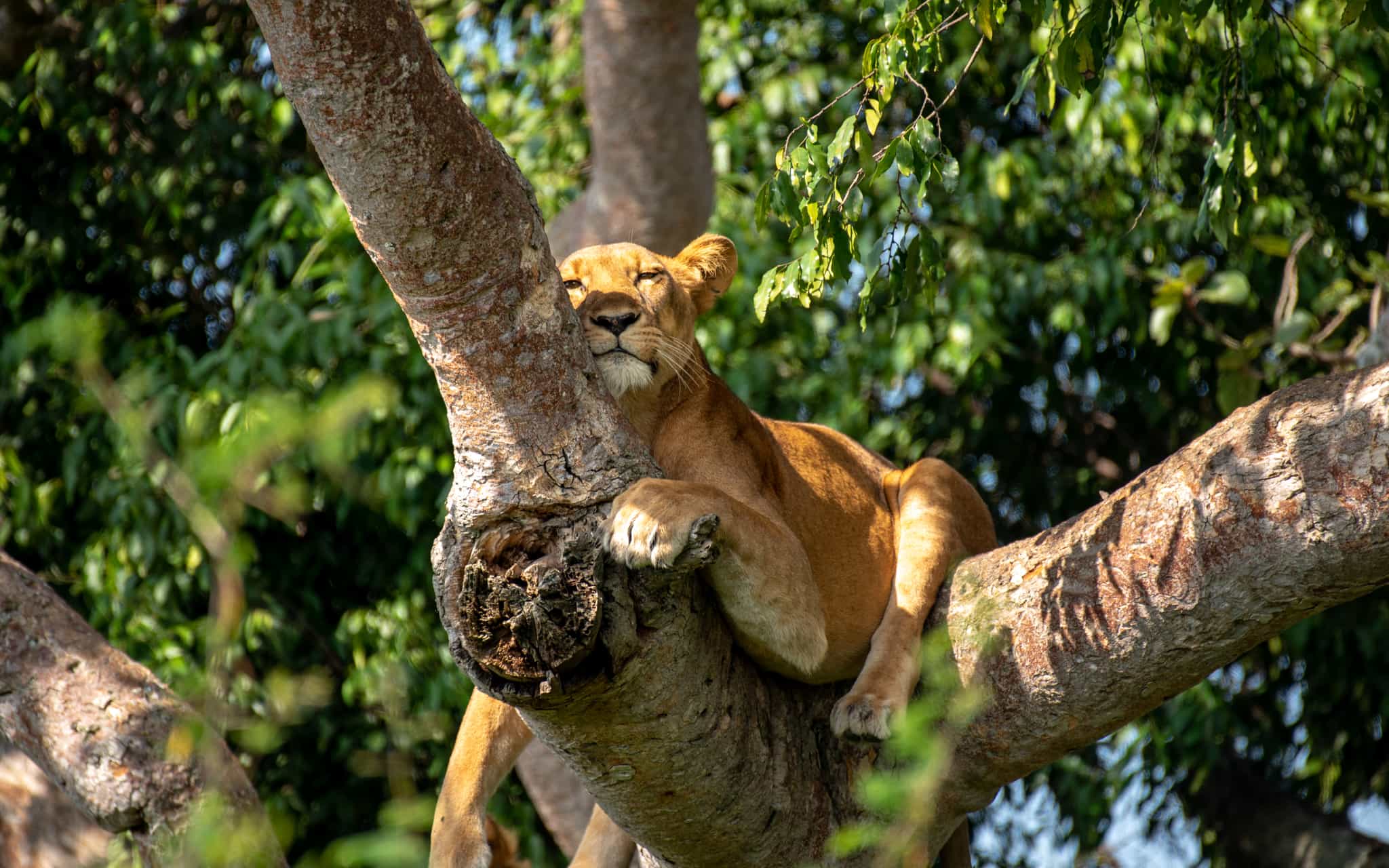
Driving
Wildlife Watching
Bid farewell to the Rwenzoris as you drive to Bwindi Impenetrable Forest National Park on an epic route through Queen Elizabeth National Park, enjoying a game drive en route. Look out for the famous tree climbing lions as well as elephants, antelopes, buffaloes, waterbucks, giraffes, leopards and many more wild animals. Have an early lunch in the park then proceed to Bwindi. Settle into your forest lodge and enjoy the creature comforts here after your camping exploits in the mountains. Enjoy sunset over the forest, ahead of a magical day tomorrow.
Day 11
Mountain gorilla tracking
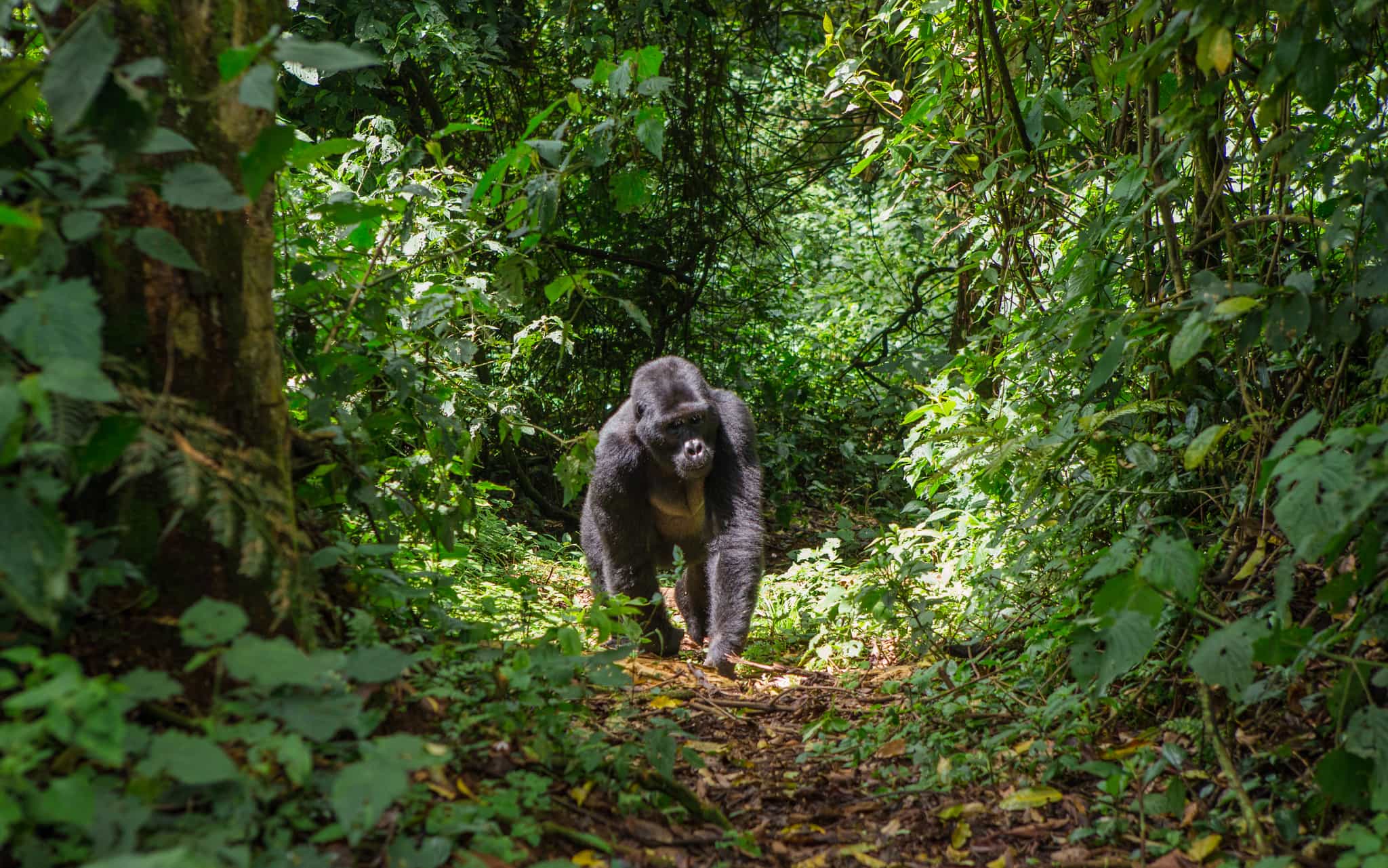
Wildlife Tracking
One of the world's most incredible wildlife encounters awaits you today. On the edge of the Bwindi Impenetrable Forest, meet up with your forest ranger guide for a briefing before starting your trek through the forest, hiking in a strictly controlled group of no more than eight people. Your ranger will know where the group of gorillas have been spending time in the forest and will lead you to the right area. You'll never forget your first sighting, and will be permitted to spend an hour with these gentle giants in their forest home. Return to the lodge for lunch and spend the rest of the day relaxing in this peaceful spot after an incredible past week of adventures.
Day 12
Bye bye Bwindi
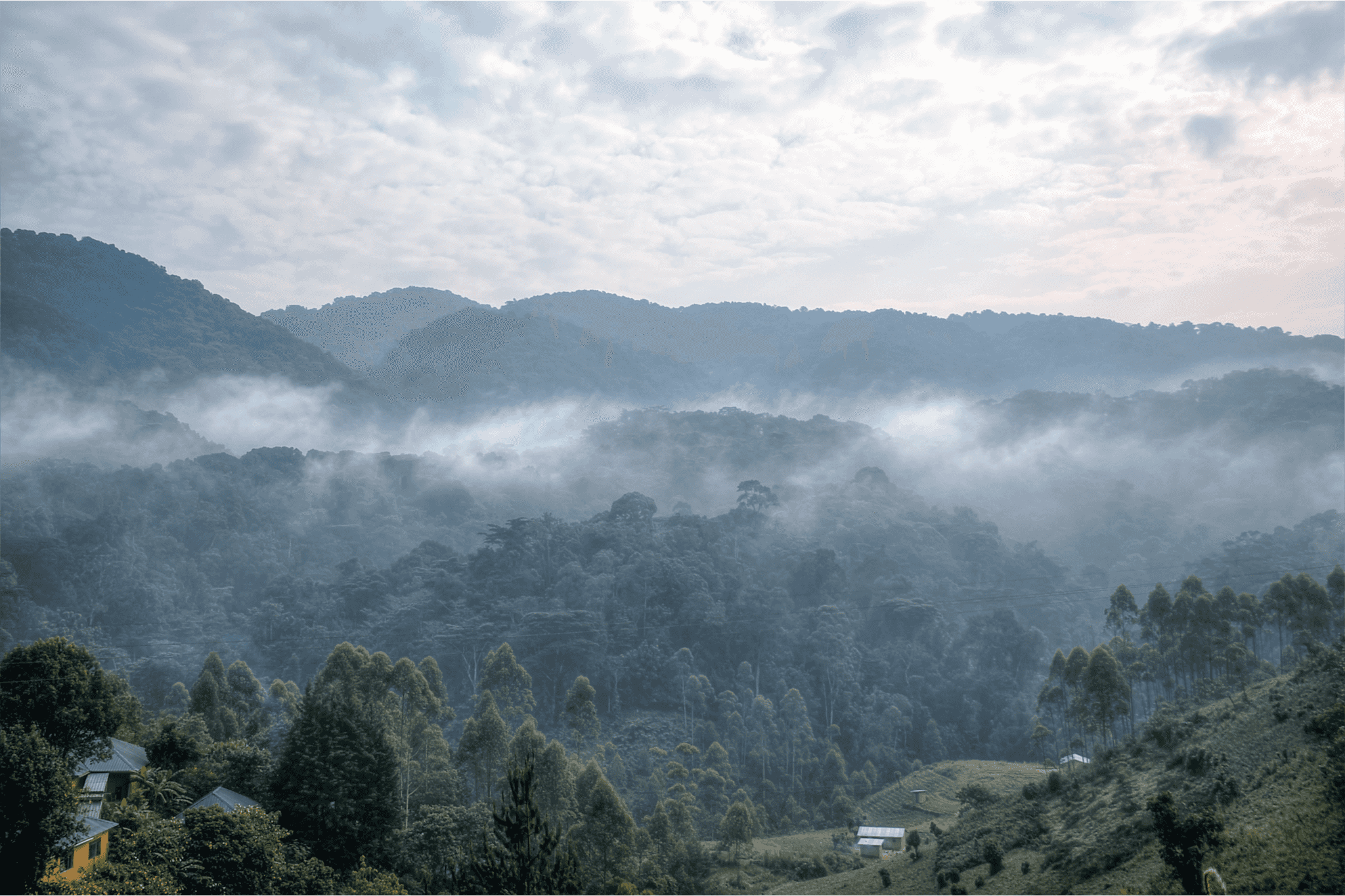
Driving
Tuck into breakfast at the lodge overlooking the forest before checking out and settling into the van for the long journey back to Entebbe. Stop for lunch in Mbarara and make another stop to stretch your legs at the equator. Back in Entebbe, head out for a farewell celebration dinner to toast successfully completing an an adventure like no other.
Day 13
Until next time, Uganda
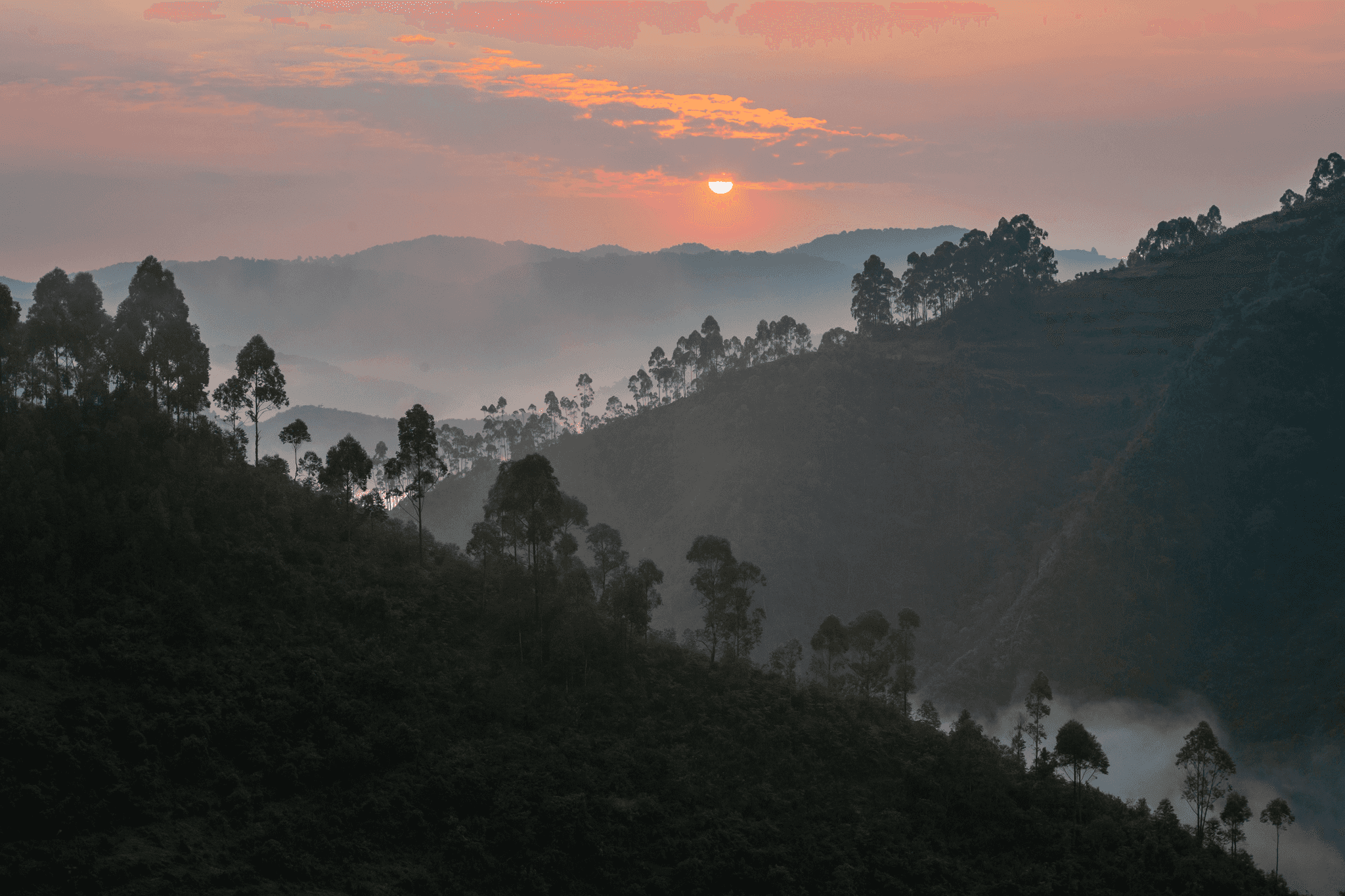
All good things must come to an end. Depending on the time of your onward flight (drop-off transfer included) you may have time to explore the beaches of Lake Victoria or visit the botanical gardens. Should you wish to book extra nights in Entebbe to extend your stay independently, then contact your host in advance.
The Area
Logistics
Starts
Entebbe Airport
Any time on Day 1
Ends
Entebbe Airport
Any time on Day 13
Transfers
Your host will meet you on arrival at Entebbe International Airport and transfer you to your guesthouse accommodation. On Day 13, your host will transfer you back to the same airport in time for your onward flight.
If you wish to arrive before the trip start date or stay on longer at the end, your host can arrange private airport transfers and guesthouse accommodation in Entebbe.
Travel options
Most flights to Entebbe transit in Dubai or Doha en route, making Entebbe easily accessible from various major hubs in the UK, Europe and North America. Another option is to fly via Kigali in Rwanda.
Day 1
Breakfast
Lunch
Dinner
Day 2 – Day 9
Breakfast
Lunch
Dinner
Day 10 – Day 11
Breakfast
Lunch
Dinner
Day 12
Breakfast
Lunch
Dinner
Day 13
Breakfast
Lunch
Dinner
What is the food like?
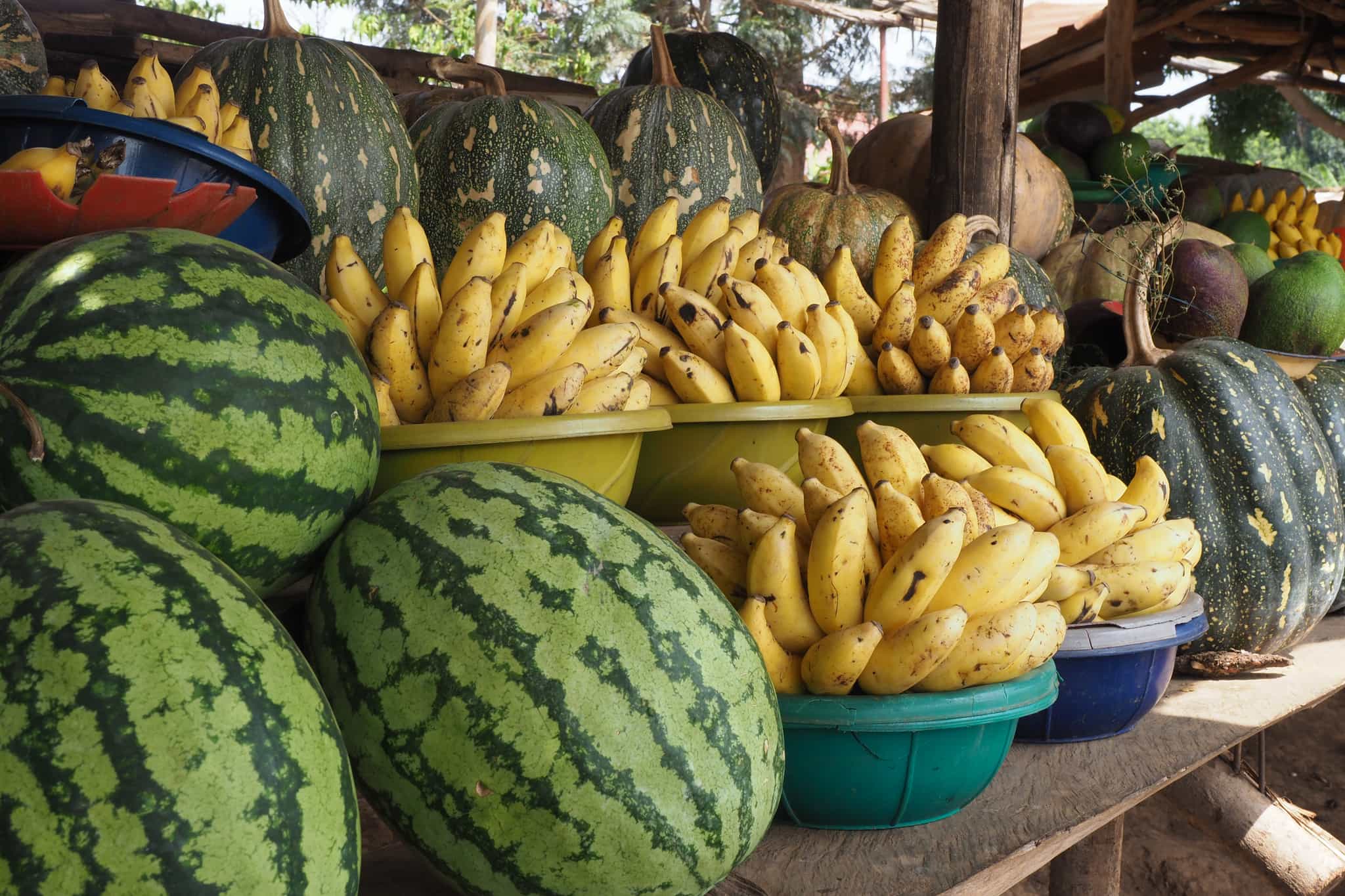
You will have a cook trekking with you as part of the expedition team in the Rwenzoris, so you'll be kept well fuelled throughout with a blend of Ugandan dishes and international meals. Outside of the Rwenzoris part of the trip, you'll encounter Uganda's wonderful array of staple foods, with fresh fruits, sweet potato, posho, beans, kalo (millet bread) and matoke (cooked green banana). These are typically combined with a beef, chicken or fish stew. The most famous street food in Uganda is the Rolex (rolled eggs), an omelette rolled in a flat Indian pancake, Kikomando (beans mixed with chapati, Indian pancake) and Nsenene (fried grasshoppers).
Vegetarians, vegans and other dietary requirements and allergies can be catered for - please just request this on your passenger info form.
What is the accommodation like?
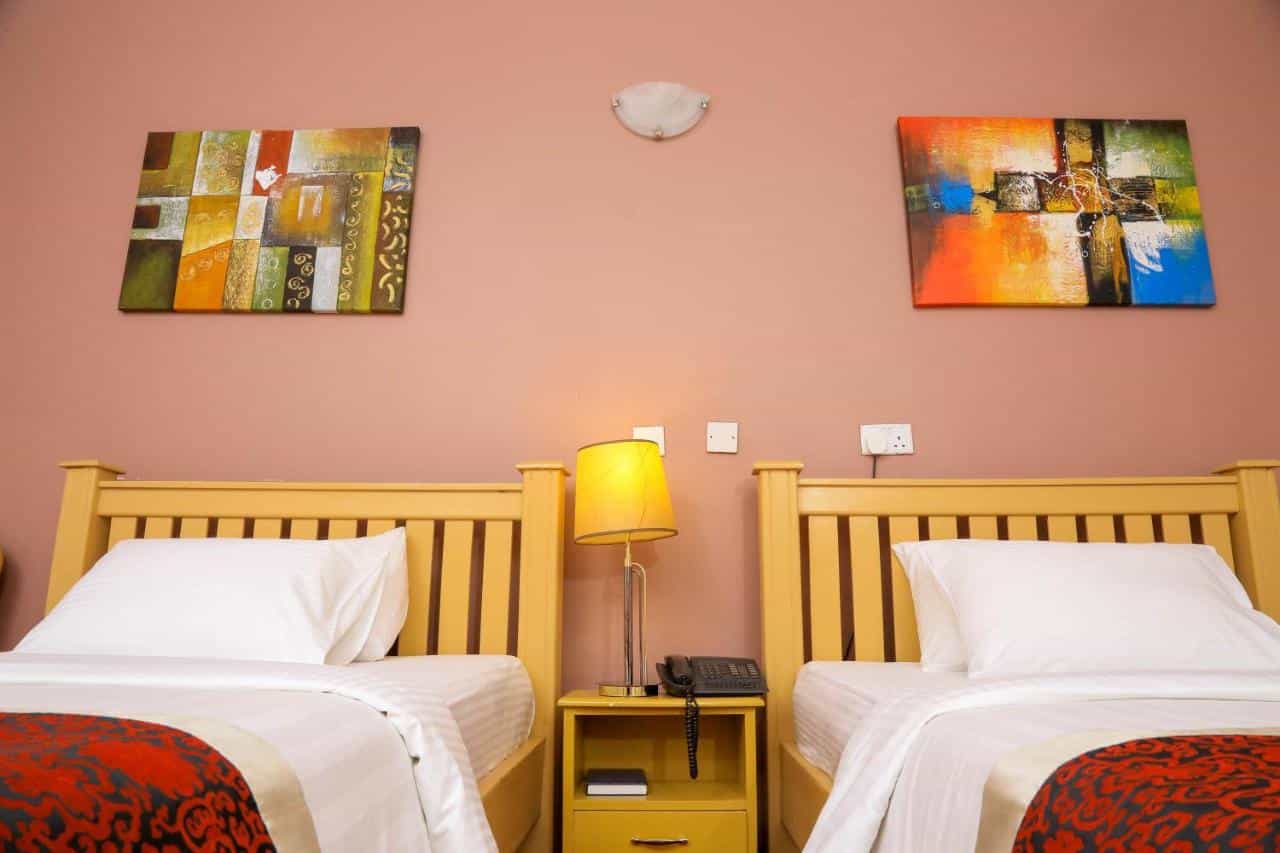
Entebbe
Your first and last nights of the trip are spent in Entebbe, Uganda's international gateway on the edge of Lake Victoria. You'll stay at the Hotel Seven Seasons in twin-share rooms with ensuite bathrooms.
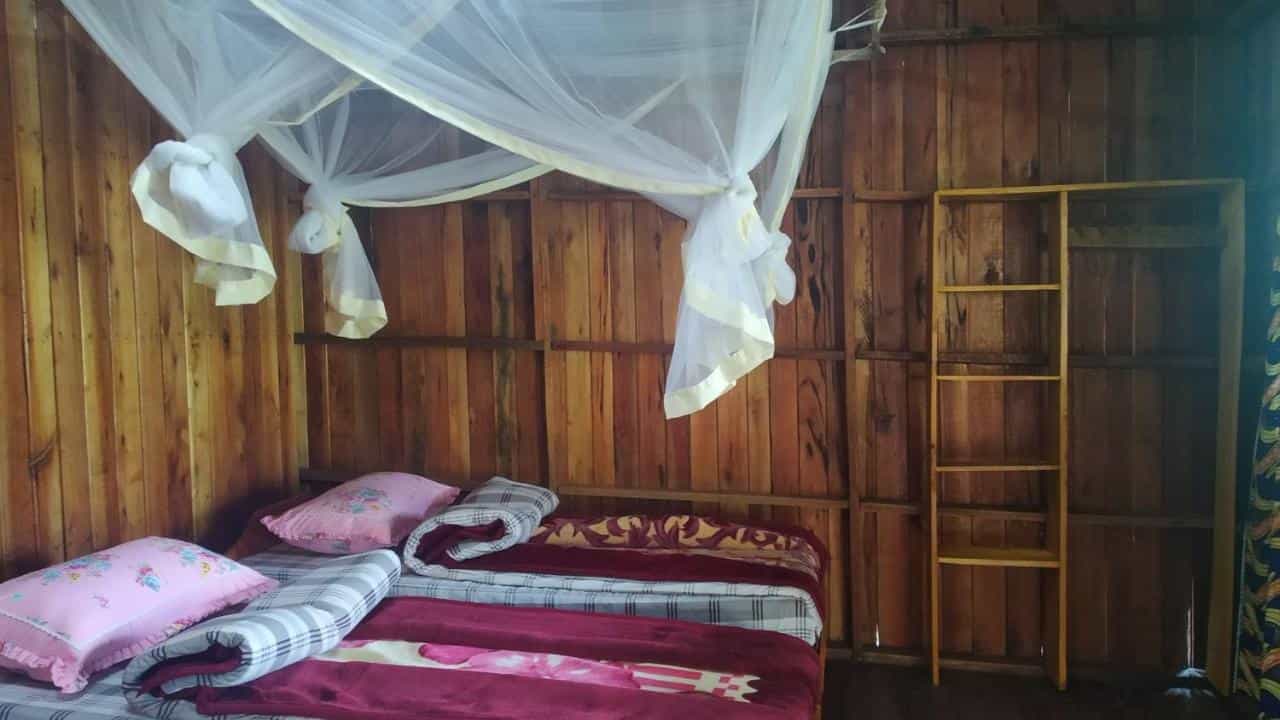
Ruboni Community Camp
At the foothills of the Rwenzori Mountains, on the eve of your trekking expedition, you'll spend one night at Ruboni Community Camp. It's managed by members of the Bakonzo Community, who have inhabited the foothills of the Rwenzoris for over 300 years. You'll stay in twin-share rooms within the lodge and enjoy a hearty breakfast here before you set off on the trail.
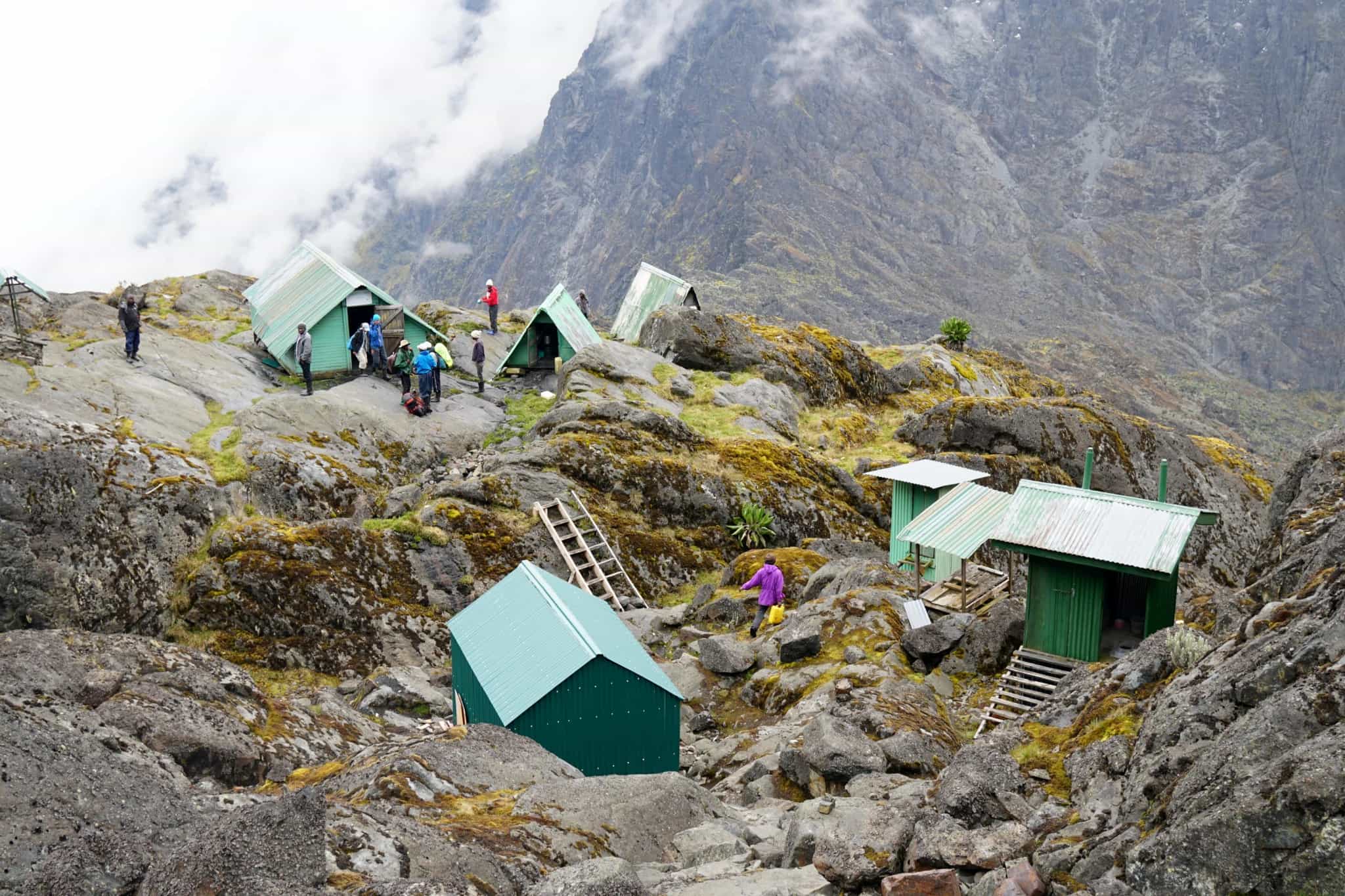
Rwenzori Mountain Huts
Throughout your trekking expedition in the Rwenzori Mountains you'll stay in a series of mountain huts – Nyabitaba, John Matte, Bujuku, Elena, Kitandra and Guy Yeoman. The huts are basic, with a dining area, a kitchen, dormitories with bunk beds and mattresses, and separate sleeping quarters for the guides. Dorms are same-sex shared, with up to 24 beds (depending on the hut). Your trekking team will provide hot water for washing, and some of the lower camps have streams or waterfalls that are warm enough to wash in. There are solar-powered outside lights at most of the huts. You'll need to bring your own sleeping bag and inflatable pillow (see kitlist).
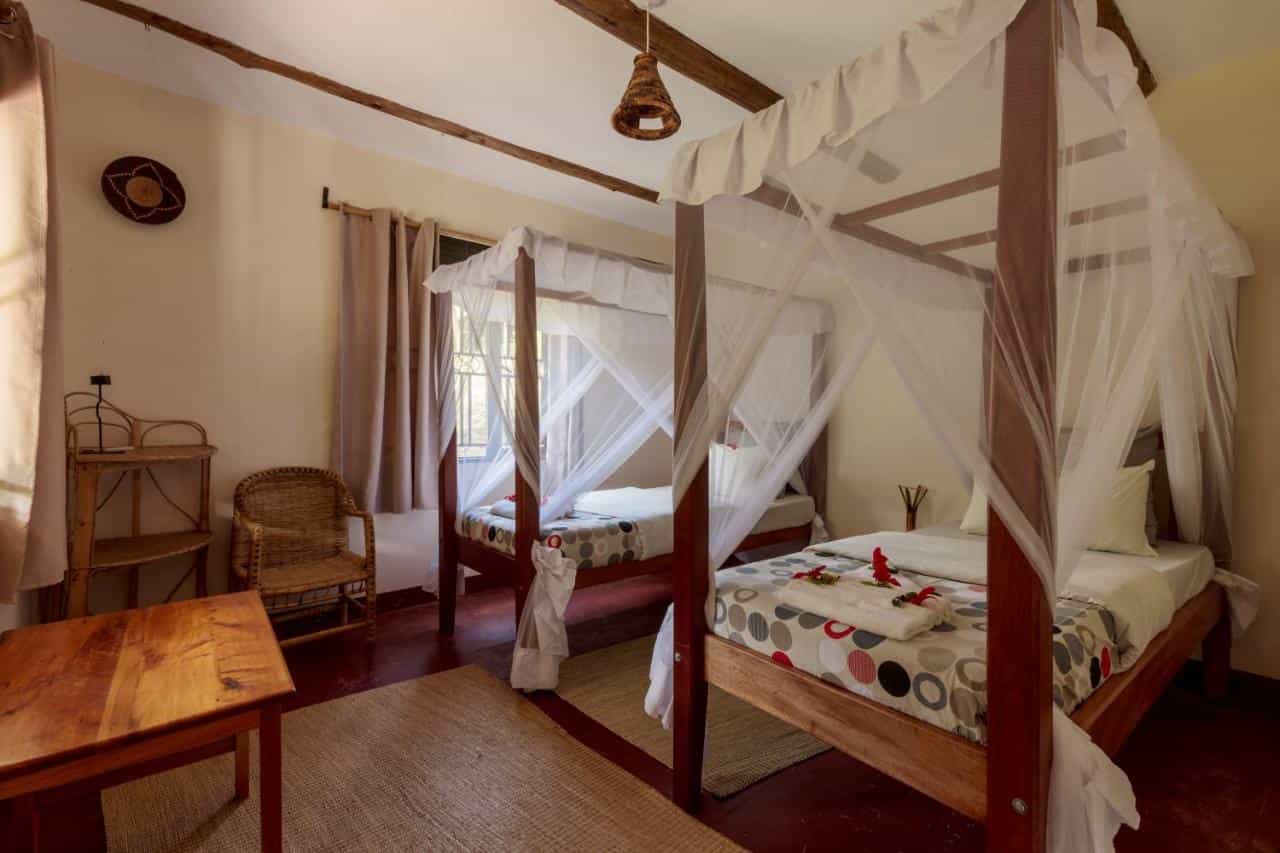
Bwindi Impenetrable Forest National Park
Either side of your once-in-a-lifetime day tracking the gorillas, you'll stay at the Gorilla Valley Lodge. Located at the border of the Bwindi Impenetrable Forest and set on a steep slope, the lodge has a truly unique setting. Imagine waking up to the sounds of the forest, having a cup of coffee or tea on your private terrace, experiencing the forest coming alive and the mist mysteriously giving way to a lush jungle. You'll stay in twin-share rooms with en-suite bathrooms.
Upgrades
For solo travellers looking for their own space during the two nights in Entebbe, the two nights at the lodge in Bwindi and the one night at Ruboni Camp, an optional private room can be booked throughout the full trip for an extra charge, see Optional Extras. Please request this at the time of booking (this is subject to availability). Please note due to the nature of the mountain huts in the Rwenzori Mountains, private rooms are not available from Day 3 through to Day 9.
We’re still waiting to collect any reviews from other travellers on this trip. However, all our hosts go through an extensive vetting process to ensure that your adventure is awesome.
Guides
Expert, local, English-speaking trekking guides
Accommodation
4 nights in lodges, 2 nights in hotels, 6 nights in mountain huts
Meals
12 breakfasts, 11 lunches and 12 dinners
Transfers
Airport transfers and everything in between
Equipment
- Tents and sleeping mats
Permits
Gorilla trekking permit and Rwenzori Mountains National Park permits
Our trips are hassle-free by design. We include all the activities and equipment, as well as many of the meals, so you can simply rock up with your rucksack and share the adventure with your new pals.
Personal Expenses
You know your own spending habits best, so please budget an appropriate amount for things like optional meals and drinks, shopping, optional activities, and laundry.
What's included?
- Crampons, ice axe, ropes, helmet & harness for the summit day
What do I need to bring?
BAGS
- Main backpack or duffel bag (will be carried by porters on the trek)*
- Smaller trekking backpack 25-40 litres
*Note that there is a weight limit of 20kg for your luggage carried by the per porter
CLOTHES
- Thermal base layers (merino wool is best)
- Waterproof jacket and trousers (Goretex advisable)
- Fleece jacket or similar
- Trousers/leggings for the evenings
- Buff or neck scarf
- Lightweight trousers/shorts/skirts
- T-shirts
- 3 pairs of outer socks, 4 pairs of inner socks
- Sunglasses
- Sunhat
- Something to sleep in
FOOTWEAR
- Waterproof hiking boots with ankle support, worn in, B1 or B2 crampon compatible
- Rubber boots, up to knee height for muddy/boggy sections of the trek
- Sandals or light shoes for around camp
SLEEPING
- Sleeping bag, 4-season with comfort rating down to -15°C/5°F
- Sleeping bag liner
- Inflatable pillow
OTHER
- Trekking poles
- Universal travel plug adapter
- Power bank or solar charger
- Passports (and visas)
- Travel insurance documents
- Ear plugs
- Mosquito repellent
- Suncream
- Personal first-aid kit (inc. blister treatment)
- Personal items (biodegradable toiletries, sanitary wear etc)
- Toilet kit (toilet paper, biodegradable bags to carry paper out to dispose of)
- Quick-dry towel
- Alcohol hand-gel
- Headtorch or torch
- Reusable 1 litre water bottle and a bladder (such as Camelbak)
- Biodegradable wet-wipes
- Energy bars and snacks - read our article on Best Hiking Snacks
- Water purification tablets/treatment system
Pre/post trip accommodation in Entebbe (single)
Payable Before Departure
Pre/post trip accommodation in Entebbe (single)
… Per night
Pre/post trip accommodation in Entebbe (twin or double)
Payable Before Departure
Pre/post trip accommodation in Entebbe (twin or double)
… Per night
Optional Private Room Upgrade
Payable Before Departure
Optional Private Room Upgrade
…
Private airport transfer - each way
Payable Before Departure
Private airport transfer - each way
…
We partner with the World Land Trust to ensure this trip achieves Net-Zero emissions. We also support their Buy an Acre programme, helping local communities to buy and protect natural habitats in perpetuity.
What's the number?
It works out on average at 354kg of CO2 emissions per person, including all local transport, accommodation, food, activities, guides, staff and office operations.
The only thing it doesn’t include right now is flights and travel to the destination. We do make an overall estimate across all our customers separately, but as we don’t book flights, have customers from all corners of the world, and no way of reliably knowing their travel plans, we simply can’t include an individual number in the figure on display here. We’ve got a goal to fix that, so that when you book, there is a way to measure and mitigate the carbon emitted by your flight too.
But what does the number mean?
Yep, hard to picture eh? To give you an idea:
- Driving 1000 miles/1609km would be approximately 281kg of CO2 in an average car (or 140.5kg per person, if there were two of you in it).
- A return economy class flight between London and New York would be approximately 1619kg (1.66 tonnes) per person.
- 10 trees in a temperate forest are estimated to remove approximately 250kg of CO2 from the air in a period of 5-10 years.
What are we doing about it?
Our trips are relatively low-carbon by design, and we're working with all our hosts to develop long term carbon reduction plans. We partner with the World Land Trust to ensure this trip achieves Net-Zero emissions. We also support their Buy an Acre programme, helping local communities to buy and protect natural habitats in perpetuity, ensuring the protection of the reserve and its wildlife.
Want to know more?
Amazingly, no international travel company has ever publicly published their carbon measurements before, as far as we know. We believe that must change, quickly. So we’re openly sharing the method we used in the hope that other companies will be able to more easily follow suit and build on what we've done so far. You'll find it all here.
Uganda is home to roughly half of the world's remaining mountain gorilla population. All permits to go and see the gorillas in Bwindi Impenetrable Forest are issued by the Uganda Wildlife Authority. There are 11 habituated gorilla families in Bwindi (out of around 36 families), and a maximum of eight permits are issued to track each habituated family per day. Permits need to be secured three months before the trip departure date, so be aware of this when making a booking. You’ll hike through the forest for up to six hours in total, and when you encounter the gorillas you’ll be permitted to spend up to an hour in their presence. Watch them play, forage and relax, and they'll likely gaze back at the odd group of humans in return. You must keep a distance of 7m from the gorillas at all times to avoid disease transmission; even a common cold can be dangerous for a gorilla. For this reason, it is not permitted to track gorillas if you are ill, nor is eating or drinking allowed. Photography is permitted, however you only have an hour, so take a few snaps and then soak up being in this magical place with these beautiful creatures.
Summiting the highest point in the Rwenzori Mountins is right up there with Kilimanjaro as a once-in-a-lifetime challenge, but you'll almost have the place to yourself. Less than 1,000 people a year walk in the Rwenzori Mountains (and not all of those summit Margherita Peak) compared with 50,000 on Kilimanjaro or 25,000 on Mount Kenya. Combining the third highest summit in Africa with trekking to see the gorillas is a real bucket-list double-whammy. This does come at a premium price tag – National Park fees and operating costs for local guides and outfits are high in the parts of Uganda this trip goes to, particularly so in the Rwenzori Mountains. Your gorilla trekking permits are included in the trip cost – these are $700 (£580) per person. This part of the trip cost, therefore, goes directly towards the conservation of the remaining population of mountain gorillas.
It is important that you pack the right type of boots to fit the crampons that will be provided. You will need a 4-season hiking boot, ideally B1 crampon compatible or hybrid. Full plastic double boots are not required and are likely to be uncomfortable for most of the terrain encountered. You can read more about crampons and selecting the right boots here.
Margherita Peak is a trekking peak, so no technical mountaineering experience is needed, however some technical equipment is used to navigate the snowy and icy conditions on the top of Mount Stanley safely. Your guides will give you full training on how to use the crampons and ice axes to safely traverse the snowcapped section.
Tips are not included in the trip cost. These are entirely at your discretion but there is an expectation to tip for good service. As a guideline, we suggest budgeting for approx. $5 USD (or equivalent) per day for the main guide of your trip, and then budget an additional $10 USD per day to cover tips to support staff such as porters, cooks and the scouts who set off to locate the gorillas before your trek. Of course, you are free to tip more or less, and the amount should be reflective of your perception of service and quality - a tip is not compulsory and should only be given when you receive excellent service.
Your guides and porters will provide treated water throughout the trek. You should bring along a reusable water bottle and a bladder or other hydration system, such as CamelBak. If you wish to have the ability to filter your own water in addition to the treated water supplied by the guides, please have a read of our guide to water filter bottles here.
Yes. You can leave any excess luggage items in the hotel in Entebbe. You should only bring one softshell bag and a smaller backpack with you to the Rwenzoris, and plan to leave any hard cases in Entebbe.
Yes, all travellers to Uganda, regardless of nationality, are required to apply for and obtain a visa prior to travel. British travellers can see the UK FCDO Uganda Travel Advice for a link to the online application form. A single entry visa costs approx. $50 USD and is typically granted within 2-3 days. Travellers are emailed a document to download or print.
Sure can! Over 70% of our travellers travel solo, it’s a great way to meet like-minded people.
Our team of Adventure Hunters co-create exclusive adventures which are run by highly vetted, specialist hosts. The trip is run by our trusted host partner in the destination. We only work with independent, local, in-destination experts who know the very best places to explore and how to stay safe. Read more information about the local teams we partner with. You’ll be introduced to the host straight after making a booking via the Much Better Adventures platform.
Much Better Adventures refer to the UK Government’s official travel advice when designing trips and monitoring trip operations. We recommend that all customers are familiar with the practical information provided on the Government’s FCDO website, where current travel advice can be found by searching for the applicable destination(s).
For customers joining this trip from other international destinations – please also read the official travel advice applicable to your country of residence/origin, as this may differ.
We recommend checking out the country-specific information and also talking to a travel nurse.
We automatically convert prices from the local currency that a host receives to your chosen currency. We update our exchange rates on a daily basis so this does mean that prices displayed on the site are subject to currency fluctuations, which is why you may see them change over time.
If you wish to change the currency you pay in, head to the bottom of the page.
All of our group adventures are specially designed for adults to enjoy as we want these adventures to bring together outdoorsy people who are truly like-minded. You must be over 18 to join one of our trips.
You're always in good company on one of our adventures.
Our trips are typically made up of a mixture of solo travellers and small groups of 2 or 3 friends, with most in their 30s-50s.
Our sociable adventures are solo-friendly by design and naturally attract outdoorsy people with a shared mindset; a love for adventure, a desire to push themselves and meet awesome, like-minded people along the way.
It’s this camaraderie that has so often turned a great adventure into a life-changing one.
Don't just take our word for it:
- 95% of people rate the group dynamics on our trips 5/5
- 90% of people recommend joining a trip to make new friends
- 75% of people have met people on our trips that they would now consider friends
See here for more info about the Much Better Adventures tribe.
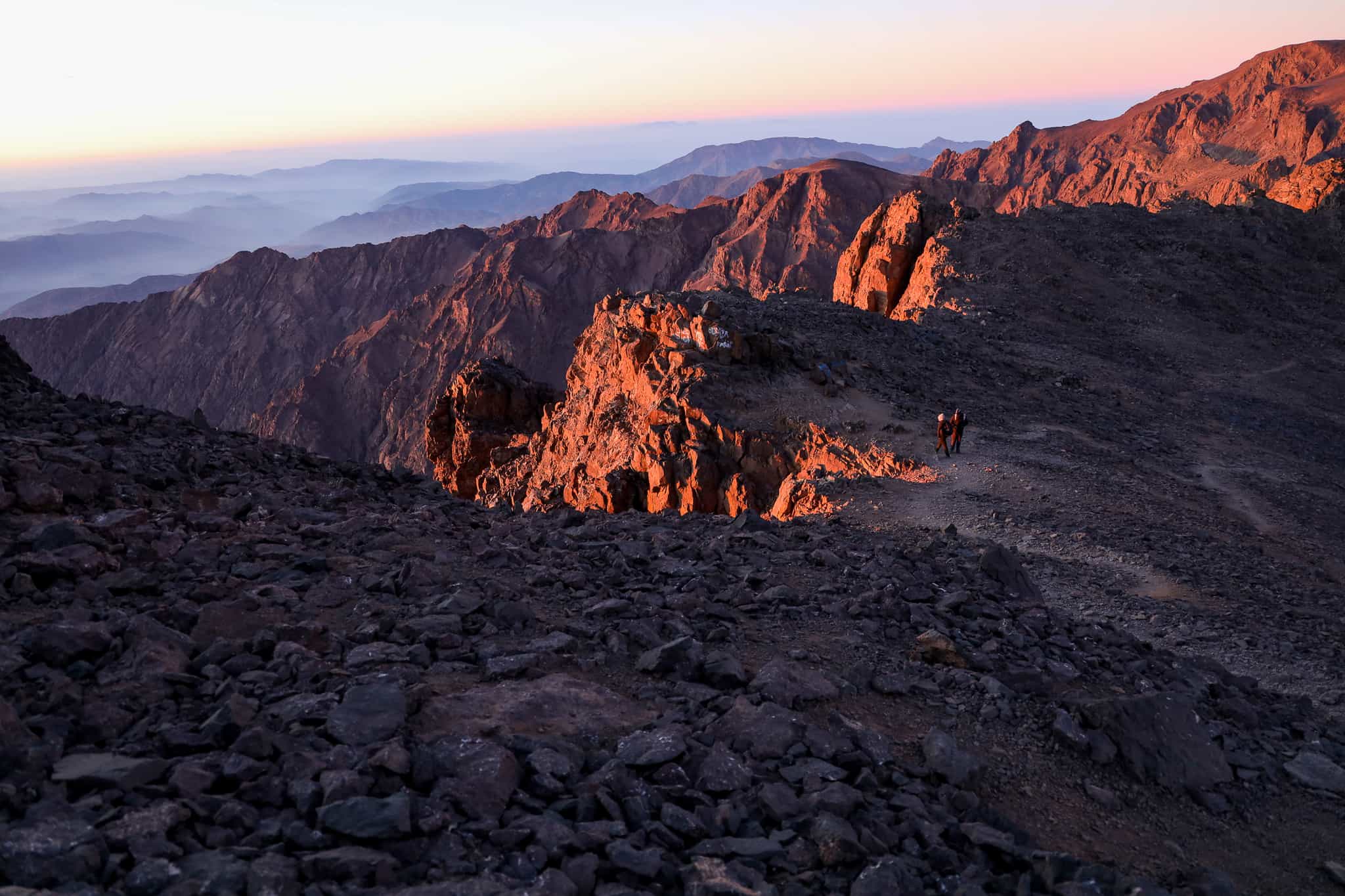
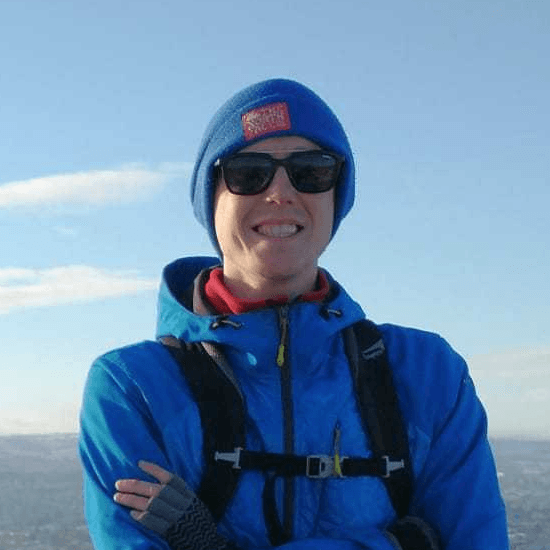
Need help finding flights?
From logistics and how to get there, to fitness, group dynamic and trip difficulty, Rory and his team of friendly experts are on hand to help.
We've got your back
Guaranteed to run
All Much Better Adventures trips are now guaranteed to run. Once you’ve booked your spot you can immediately make your travel arrangements, no uncertainty, no hanging about (excludes 'request to book' departures). Full details
Flexible payments
Secure your spot with the minimum deposit and pay off the remaining balance in as many instalments as you like, with no interest or fees. Full details
Happiness Guarantee
We’re so confident you’ll have an amazing time we’ll put our money on it. Full details
Full financial protection
To give you complete peace of mind Much Better Adventures is backed by ABTOT, ABTA and ATOL memberships. Full details
Tried & Trusted
Much Better Adventures is rated ‘Excellent’ on Trustpilot with over 1000 verified trip reviews averaging 4.8/5.
Connect before you go
You'll be invited to join a WhatsApp group to get to know each other before your big adventure together. Full details
DEPARTURE DATES
